Are You Ready? Applications for CVE and CVP Now Accepted
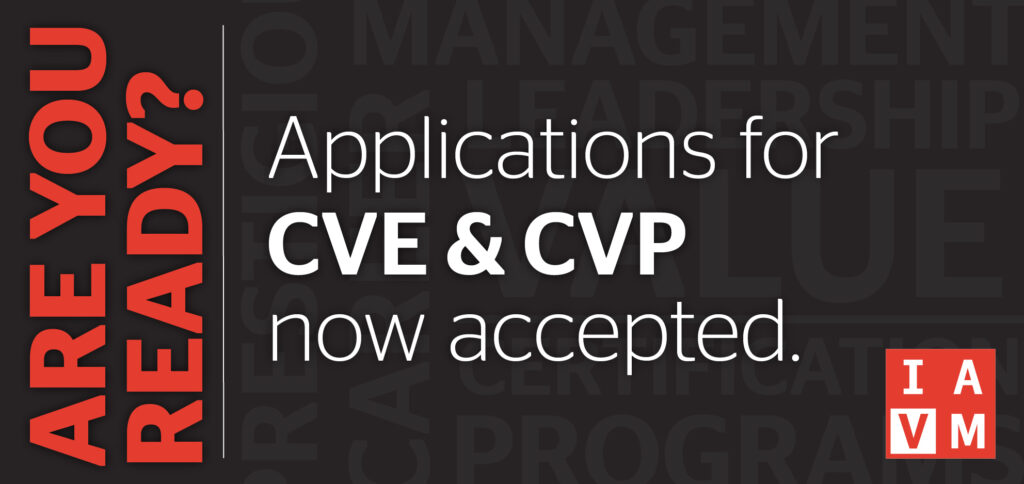
Whether you are starting your journey into venue management or on the path to a fulfilling career, certification is your map to career enhancement.
“When you achieve your certification, you are communicating to current and future employers that you are well-versed in all areas of venue management (including venue types you’ve never worked at), have invested in your professional growth and the growth of others, and are dedicated to the advancement of the venue industry,” stated Beth Wade, CVE, Chair of the IAVM Certification Board about why members should seek to become certified through IAVM. “I know the certification process is challenging and requires time, but the pride you will have when you join our growing group of CVP’s and CVE’s, will be immeasurable. It’s time to become certified…DO IT FOR YOU!”
The Certification Board has recently made a few notable changes to the process for achieving certification-
- the number of years of service for a CVE has been lowered to 5 years
- 20 points are now being given for CVE and CVP candidates with a 2 year/Associates/TAFE diploma program.
Now’s the time to take the steps and join that group of your peers who have reached the pinnacle of achievement with IAVM by becoming a Certified Venue Executive (CVE) or Certified Venue Professional (CVP).
To learn more about how to earn your CVE or CVP designation, click here.
Applications for CVE are due no later than November 1, 2023. Don’t delay! Submit your application today!
Venue Managers Remember Jimmy Buffett – An Anchor Tenant, A Citywide Celebration, A Coveted Booking Coup
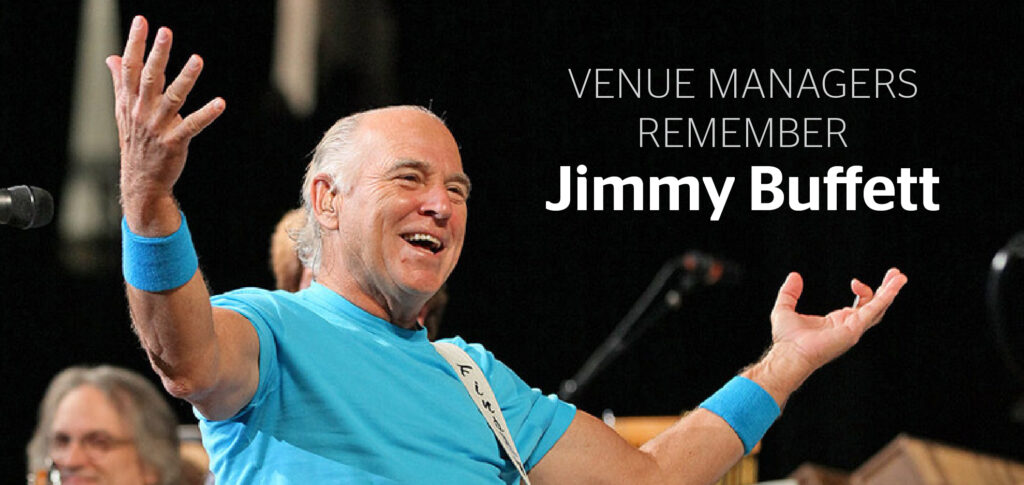
“If you had a Buffett date, you just couldn’t get the happy off your face,” said Russ Simons, Venue Solutions Group.
Jerry MacDonald, president and CEO, Cynthia Woods Mitchell Pavilion, The Woodlands, Texas, lost an anchor tenant when the legendary lifestyle singer/songwriter Jimmy Buffett passed away Sept. 1.
MacDonald, a member of IAVM for 47 years and in the business for 48, booked Buffett in all six buildings he has managed (Lakeland, Daytona Beach, Miami, Memphis and Houston’s Summit), but most frequently at the Pavilion. Buffett holds the record for the most plays — 25 performances there, including in the opening year, 1990.
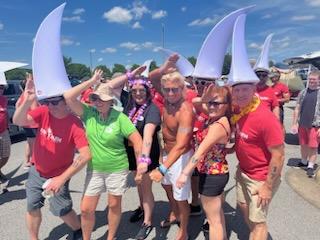
Photo provided by Nick Zazal, CVP, Walmart AMP, Rogers, AR
“From a building standpoint, there are some shows you want to play every year,” MacDonald said. “That helped our food and beverage per cap, season ticket sales, box seat sales. Dave Matthews, Santana, Earth Wind and Fire, are also anchor plays. Buffet always helped sell season tickets and box seat sales. It was important.”
Buffett always preferred outdoor dates, much to the chagrin of Parrothead Lee Zeidman, Crypto.com Arena, Los Angeles, who strived but failed to book Buffett. “He’s never played any of my venues even though I threw out numerous offers. If there was one act in my 40-year career I regretfully failed to book, it’s Jimmy Buffett. As hard as I tried, working everybody I knew.”
Like many in the venue industry, Zeidman posted a great tribute to Buffett on social media, LinkedIn in his case. “I’m a Parrothead. I saw him numerous times at the MGM in Vegas. I bumped into him backstage because I had some access. I told him I would turn LA. Live into Margaritaville and our event deck into a tailgate area – whatever he wanted. He said, ‘You’ve got to talk to Howard [Kaufman] and Irving [Azoff].’”
“Since I’m a Parrothead. I was devastated over the weekend. Buffett was one of my all-time favorite artists, singer/songwriters. To some extent, you could say I sort of patterned my lifestyle — beaches, bars and harbors — around what he did,” Zeidman said.
There are several Parrotheads (Jimmy Buffett fans) in the ranks of venue managers, perhaps none more so than Nick Zazal, CVP, Walmart AMP, Rogers, Ark.
“For me, it was a really big day [when Jimmy Buffett finally played Walmart AMP June 9, 2022]. I’ve seen him 16 times in concert. Those are some of the best memories of my life,” Zazal said.
Hosting Buffett, booked through Live Nation, meant coordinating with the local Parrothead Club to accommodate tailgating. That club includes a group called Fin Men, for the four-foot tall shark fin hats they wear, Zazal said. “The Fin Men all gathered at the concert here in Northwest Arkansas because most of them are from this region. It was the largest gathering of the Fin Men ever. When they played the big hits, the Fin Men would parade down the aisle. It was a sight to see,” Zazal said.
Even though his is an outdoor venue, Buffett’s tour was a logistical challenge because Walmart AMP is landlocked, surrounded by office buildings with which they share parking use agreements. They had to find a remote shopping mall on the other side of the river for the tailgate contingent, a big part of the Buffett festival experience. Then they had to shuttle them to the show.
“The thing about Parrotheads, and why I love them so much, is they make the best of everything. They were going to find each other and have a party no matter where we put them,” Zazal said.
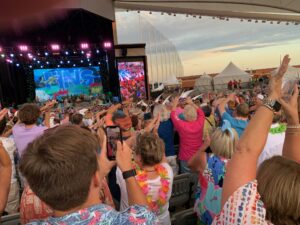
Photo provided by Nick Zazal, CVP, Walmart AMP, Rogers, AR
Zazal will always treasure the “first and only time I got to host Jimmy.” The tour was still pretty locked down in terms of the Covid Bubble around Jimmy, with no meet and greets. As much as he wanted to, Zazal didn’t do any presentations of gifts, respecting the bubble, thinking “I’ll get him next time.They were fully intending to come back because they had such a good time.”
He does, however, have a gift of his own to remember the show — a Margarataville Frozen Concoction Blender —which he received in the mail a month after the show.
“It’s the only gift I’ve ever gotten from a tour,” Zazal said.
Coordinating with the local fan club, the Parrotheads, is critical to a Buffet tour. For Michael Marion, CVE, Simmons Bank Arena, North Little Rock, Ark., advancing a Buffet date had added dimensions.
“The mayor at the time of North Little Rock was a Parrothead. Normally, when we do a show, we meet internally and the director of event services interacts with the local police. But for Jimmy Buffett, we had a meeting in City Hall with all the department heads. It was a major away-from-the-building operation in terms of making room for these people, organizing them. The city had to handle that because it’s not on our property. Our building is right on the Arkansas River. Right down the street is the River Wall (flood wall), that’s where we put ‘em all. We set it aside for the Parrotheads.”
Buffett dates bring a colorful crowd, everyone wearing a Hawaiian shirt. Backstage, it’s a straight ahead operation, not real eventful, said Marion, who managed to book Buffet twice in his long arena career.
“We were supposed to do him three times, but the show scheduled for December, got snowed in in Tulsa and he couldn’t get here,” Marion remembers. “We had to cancel the show. Everyone was here, ready to go. Jimmy did a video on YouTube saying ‘well, so much for the winter tour.’”
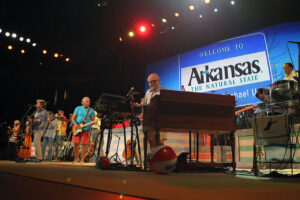
Photo provided Michael Marion, CVE, Simmons Bank Arena, North Little Rock, AR
For the longest time Buffett did nothing but outdoor dates. Finally they decided to come back inside, so it was a big, big, big deal in North Little Rock, Marion said. His first play there was March 1, 2012. He came back June 6, 2019. “We had our hand up a long time to get [a Buffet date],” Marion said.
“I can’t believe I got something Lee Zeidman didn’t get and I did it twice,” Marion chortled.
Allen Johnson, chief venues officer, Orlando Venues, first booked Buffett when he was in West Palm Beach in the mid-80’s, though he did work a Buffett date as a ticket seller at Camping World Stadium, Orlando, in 1979. That year, Buffett opened for the Eagles Hotel California tour, he recalled.
When he managed the Lakeland (Fla.) Civic Center, the tour rehearsed there for a week because they had added a new back-up singer.
“My favorite show would be April 14, 2018, a double bill at the [Camping World] stadium with Jimmy Buffett first and the Eagles second. It’s one of my top five for sure, Even though I was working and I had 45,000-plus of my closest friends around me, it was memorable. It was a typical Buffett show with everyone dressed in Hawaiian/casual shirts and when the Eagles came on, they shifted into laid-back Eagles mode.”
He also booked Buffett at the Amway Center arena, which made tailgating a challenge. “We roped off Division Street and sold parking spaces for RVs, and even a trailer and boat. We also had Margaritaville on the street and on the top floor of our parking garage. His shows always had a tailgate experience, from sitting around vehicles to venues setting up Margaritaville pre-parties.”
You had to involve the local Parrothead Club, because they were going to do something, and you wanted to make sure you did it together so it had some sort of organization to it, Johnson said.
They had a history of closing the street in front of the arena for Orlando Magic games, which led to the RV parking idea. The arena concessionaire at the time, Levy, wanted to plan the rooftop party to capture early sales opportunities.
On a Buffett show, you also knew food and drink would do well.
One Buffett memory that will always stick with Simons is the excitement displayed by Chris Reynolds, his number two in food service for Delaware North when he had booked Buffett at Bridgestone Arena in Nashville.
Reynolds had done a lot of due diligence advancing the date. “He made (and I’m probably overstating this) 50 65-gallon garbage cans full of Margaritas. They were everywhere. His excitement was palatable to all of the rest of us,” Simons said.
A Buffett date was certain to be great for building, staff, fans, and downtown. “We regularly do events; we’re really good at them. But from anticipation to event to sheer exhaustion after the show, it was special,” Simons said.
Buffet made sure of it. His concerts were festivals, and the supporting events went well beyond tailgating. He had his political causes. He was known for his “Save the Manatees” outreach in Florida, for one.
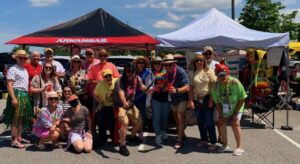
Photo provided by Nick Zazal, CVP, Walmart AMP, Rogers, AR
Day of show, he sent a specially designed golf cart with crew to video the day’s tailgating parties, which became part of the live show video later that night.
He would do his Bing & Bong Show schtick on Margaritaville TV and Radio before each show, MacDonald recalled, interviewing various tour pros like Michael Utley or Mac McAnally or visiting celebrities, like J.J. Watt of the Texans. J.J. then played bongos on stage with Buffett. And every show was broadcast live.
“He has a connection here in the Woodlands, Coleman Sisson,” MacDonald said. Sisson helped Buffett start Margaritaville Radio and TV. Their longtime relationship began when Sisson was an IT guy with Compaq and Buffett needed tech help when he bought his first computer. He called Compaq, got Coleman and they became great friends. When Buffett made it big, he hired Sisson to do all his IT. Sisson came up with an idea how to broadcast and televise Buffett’s shows every night. And Sisson lives in the Woodlands.
“When I was in Miami, Buffett had courtside season tickets to the Miami Heat; we gave him a special parking place,” MacDonald said of his long history with the legend. “He would fly up from Key West.
“One year, when I was in Houston, Buffett got a little excited at a Miami Heat game in Miami and the referee threw him out. We had him booked a week or two later in Houston [at the Summit].
“When he came here, I presented him with an official NBA referee jersey, might even have had the number of the guy who threw him out. He put that on and wore it the whole afternoon.”
Someone gives someone a blender. Someone gives someone an NBA referee’s jersey.
It’s a relationship business, top to bottom. That always fun relationship with Jimmy Buffett will be greatly missed by venue managers worldwide.
As Zeidman says, “It’s just a major loss.”
US Congress Launches Historic Stadium Caucus to Protect America’s Most Treasured Stadiums
US Representatives Garret Graves (R–Louisiana) and Mark Pocan (D–Wisconsin) have announced the launch of the Historic Stadium Caucus. The caucus will bring together a bipartisan group of Congressmembers to work on preserving the legacy and protecting the integrity of these treasured venues across America while enhancing their capabilities, so they are able to continue to host world-class sporting events and concerts for generations to come.
“When Tiger fans walk into Death Valley on Saturday nights, they do more than watch a football game – they walk into a 99-year-old local icon that supports our regional economy. Every bowl of jambalaya scooped and Tiger Dog served injects jobs and resources into our community,” said Rep. Graves, who represents Louisiana’s 6th Congressional District which includes Tiger Stadium, home of the LSU Tigers. “I am proud to join Rep. Pocan to preserve the legacies of some of our most historic landmarks and create new memories for future generations.”
In launching the Historic Stadium Caucus, Reps. Pocan and Graves recognize the significance of these iconic venues and are seeking to protect their value while adapting them to meet evolving needs. The caucus will bring much-needed attention to historic stadiums that were among the first major athletic venues in the United States and continue to host some of sport and entertainment’s most marquee events each year. Furthermore, these historic venues are economic catalysts for their local economies and emergency preparedness centers for local, county and state agencies.
“Historic stadiums, like Camp Randall Stadium where the University of Wisconsin-Madison Badgers play, serve a vital role in our communities,” said Rep. Pocan, who represents Wisconsin’s 2nd Congressional District. “Not only are they where memories are made and young people get inspired to play sports, but they’re often hubs of economic activity. We must do everything we can to protect these iconic venues in our communities. I’m glad to join Representative Graves in forming the bipartisan Historic Stadiums Caucus and look forward to the work we’ll accomplish together.”
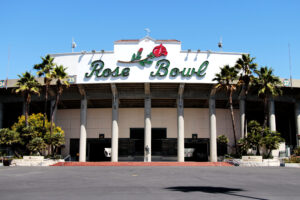
Among the stadiums that the caucus includes is the oldest remaining football stadium in the United States, University of Penn’s Franklin Field that opened in 1895. The Rose Bowl Stadium, built in 1922 in Pasadena, California, has hosted five Super Bowl games, gold medal matches for two Olympic Games with a third coming to the venue in 2028, two FIFA World Cup Finals, the 1982 Army-Navy Game, UCLA Football since 1982, and the annual Rose Bowl Game® since 1923. Now in its centennial year, Los Angeles Memorial Coliseum will host its third Olympic Games in 2028 after hosting in 1932 and 1984. The Rose Bowl Stadium and the Los Angeles Memorial Coliseum will become the first venues in history to host the Olympic Games three times. Wisconsin’s Camp Randall Stadium has been home to the Wisconsin Badgers football team since 1917 and witnessed the rise of football icons like Heisman Trophy winner Alan Ameche and J.J. Watt. Entering its centennial season in 2024, LSU’s Tiger Stadium has seen multiple NFL superstars jumpstart their careers, from quarterbacks Y.A. Tittle in the 1940s to Joe Burrow in the 2010s.
“Historic stadiums, such as Tiger Stadium at LSU, play an important role in the environment that makes college athletics special. The game day traditions in iconic venues around the country are unique and are worthy of discussion,” said LSU Athletic Director Scott Woodward. “I appreciate the Historic Stadium Caucus co-chairs, Garret Graves and Mark Pocan, for recognizing the need for healthy dialogue around the protection of historic stadiums.”
The launch of the Historic Stadium Caucus marks a pivotal moment in the preservation and modernization of historic stadiums. The caucus’ commitment to protecting some of America’s national historic landmarks will help focus attention on the infrastructure needs of historic college football stadiums throughout the country.
“Since I was 10 years old, the Rose Bowl, the Coliseum and so many others have truly been pillars in what they represent to so many people around the country,” said Ronnie Lott, College and Pro Football Hall of Famer who won four Super Bowls in his career and former USC Trojan. “We must protect these historic buildings around the country due to what they mean in their communities and to those who use them daily. The infrastructure is truly important to keep these iconic places going for many more years to come.”
“I’ve had the honor of playing in so many historic stadiums over the course of my career, from the Rose Bowl to Cotton Bowl, and a variety in between. It’s not just about the athletes taking the field, but the environment that these iconic stadiums create for the fans – the energy feels electric and as a soccer player, creates the ‘12th man,’ so to speak,” said Cobi Jones, a National Soccer Hall of Fame inductee and the all-time leader in international appearances for the United States Men’s National Soccer Team. “The preservation and appropriate infrastructure developments of these stadiums should be front and center, as they are a link to our past and a gateway to our future for families, sports, entertainment and more.”
At the launch, eighteen of the most iconic college football venues are committed to participating in the Historic Stadium Caucus. These include:
- Beaver Stadium (Penn State University, State College, Pennsylvania),
- Camp Randall Stadium (University of Wisconsin, Madison, Wisconsin),
- Cotton Bowl (Dallas, Texas),
- Davis Wade Stadium (Mississippi State University, Starkville, Mississippi),
- Franklin Field (University of Pennsylvania, Philadelphia, Pennsylvania),
- Husky Stadium (University of Washington, Seattle, Washington),
- Jordan-Hare Stadium (Auburn University, Auburn, Alabama),
- Los Angeles Memorial Coliseum (University of Southern California, Los Angeles, California),
- Memorial Stadium (University of California, Berkeley, California),
- Memorial Stadium (University of Illinois, Champaign, Illinois),
- Memorial Stadium (Clemson University, Clemson, South Carolina),
- Nippert Stadium (University of Cincinnati, Cincinnati, Ohio),
- Rose Bowl Stadium (Pasadena, California),
- SJSU Spartan Stadium (San Jose State University, San Jose, California),
- Tiger Stadium (Louisiana State University, Baton Rouge, Louisiana),
- Vaught–Hemingway Stadium at Hollingsworth Field (University of Mississippi, Oxford, Mississippi),
- Wallace Wade Stadium (Duke University, Durham, North Carolina), and
- Yale Bowl (Yale University, New Haven, Connecticut).
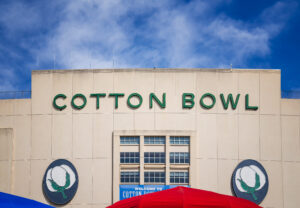
“Historic stadiums like the Rose Bowl have been the backbone of American sports and entertainment for over a century, but their viability and continued operations are in jeopardy with the evolving landscape and expectations of modern-day sports and entertainment,” said Jens Weiden, General Manager and Chief Executive Officer of the Rose Bowl Stadium. “History is the soul of these stadiums, and they hold a special place in the heart of our communities as valuable engines for economic impact and emergency preparedness. We thank Representatives Graves and Pocan for their leadership in the formation of the Historic Stadium Caucus and are grateful to the other members who have joined the caucus. The Rose Bowl has been a critical voice and a leader in the need for the Historic Stadium Caucus. We believe the launch of the caucus will be a crucial step forward in protecting these iconic venues from being overshadowed and will undoubtedly work towards the appropriate preservation and infrastructure necessities that can continue to energize their existence.”
The mission of the Caucus is to assist representatives of historic stadiums – and those who are passionate about safeguarding iconic venues – in ensuring the stadiums can stay up-to-date with the latest technological advancements and security measures, as well as environmental practices, all while preserving their rich historical legacy.
Some of the key areas that the Historic Stadium Caucus will focus on are:
- Security and Safety enhancements: With growing concerns about safety and security in public spaces, the caucus will focus on how the historic stadiums are able to implement cutting-edge security measures without compromising the historical character or footprint of the stadiums. This will enable these venues to continue to host events with an iconic energy, such as major college and professional sporting events, national and globally-significant competitions, and concerts by world-class musicians.
- Technological Upgrades: Given the amount of fans each venue welcomes annually, the Historic Stadium Caucus will help focus attention on the fact that these stadiums – many of which are over or nearing 100 years old – are in need of technological upgrades to ensure that these iconic venues can meet the modern-day patron standard as well as the expectations put forth to remain leaders in compliance related to local, state and federal safety standards.
- Funding for Infrastructure Updates: As with many historic buildings, some stadiums could benefit from essential infrastructure upgrades. While these venues have stood the test of time, ensuring their continued functionality and longevity requires investments in their infrastructure not just for significant sports and entertainment events, but for the appropriate use by the communities that they serve in times of positive togetherness, but emergency needs, as well.
The historic stadiums are not only the locations for some of the most significant sporting events of all time, but they are also where sportsmanship, leadership, and teamwork are fostered and on display from the student-athletes, coaches and administrators that steward their continued existence.
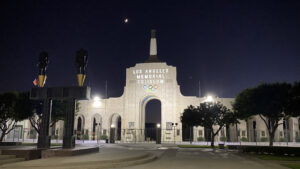 “It is important to remember that these historic stadiums are not just grass, goalposts, and concrete. They are a point of pride for cities and states where generations have come together to cheer, celebrate, and create lasting memories,” said Dedan Brozino, President of the Rose Bowl Legacy Foundation, which has a mission of protecting, preserving, and enhancing the future of the Rose Bowl Stadium. “By investing in infrastructure, we are not only preserving the physical structures, but also strengthening the cultural heritage, sense of identity and sportsmanship initiatives that these stadiums represent. This effort will undoubtedly ensure that these hallowed grounds continue to serve as symbols of unity, passion, and community for the next generation.”
“It is important to remember that these historic stadiums are not just grass, goalposts, and concrete. They are a point of pride for cities and states where generations have come together to cheer, celebrate, and create lasting memories,” said Dedan Brozino, President of the Rose Bowl Legacy Foundation, which has a mission of protecting, preserving, and enhancing the future of the Rose Bowl Stadium. “By investing in infrastructure, we are not only preserving the physical structures, but also strengthening the cultural heritage, sense of identity and sportsmanship initiatives that these stadiums represent. This effort will undoubtedly ensure that these hallowed grounds continue to serve as symbols of unity, passion, and community for the next generation.”
The Historic Stadium Caucus’ co-chairs, Reps. Graves and Pocan, will circulate a “Dear Colleague” letter to ask other members of Congress to join, and move forward discussing strategies to preserve the historic stadiums across America.
For more information on the Historic Stadium Caucus, please contact the following:
- For Rep. Pocan: Erin Schnell at erin.schnell@mail.house.gov or (202) 225-2906
- For Rep. Graves: Logan De La Barre-Hays at logan.delabarrehays@mail.house.gov or (202) 225-3901
For more information on America’s historic stadiums, please contact Rose Bowl Legacy Foundation President Dedan Brozino at dbrozino@rosebowlstadium.com or (626) 577-2540.
ASM GLOBAL GRANTS RECORD NUMBER OF COLLEGE SCHOLARSHIPS AND UNVEILS ‘GROW’ INITIATIVE

As part of its rapidly expanding ASM Global Acts worldwide sustainability and equity program, the world’s largest entertainment- and venue- operating company has announced granting a record number of U.S. college scholarships and additionally unveiled a major global university student program — “GROW” — providing unprecedented opportunities for the industry’s next generation of leaders.
Funded by the ASM Global Acts Foundation, ASM Global Stars Scholarship gives students in under-resourced communities across the U.S. educational and career development opportunities, creating accessible pathways to pursue their education and career goals. The program this year has awarded 50 scholarships valued at $125,000 (up from 28 and $70,000 last year) to students in 39 cities (up from 14 in 2022).
The new GROW program focuses on cultivating similar experiences worldwide. It provides the world’s largest portfolio of venues with the necessary resources to create internship programs and meaningful work experiences for university students. It fulfills ASM Global Acts goal to provide job opportunities, experienced networks, purposeful work and entry opportunities in the live entertainment business throughout the world.
GROW career experiences are available in marketing, operations, event management, human resources, finance, IT, sales, procurement, guest service, security, and food and beverage.
By the end of 2023, GROW will be hosting over 100 university students around the globe and looks forward to growing that number significantly in 2024.
ASM Global’s President and CEO Ron Bension said, “GROW is an acronym for gathering knowledge, realizing your potential, opportunities awaiting and engaging in work that matters. We intend to deliver all of that and more to students who want to be a part of the next generation of leaders in one of the world’s most exciting and fulfilling careers: live entertainment.”
Shauna Elvin, chief human resources officer, said, “We’re committed to curating introductory opportunities and exposure in the universe of venue management throughout our business units internationally. Through engaging hands-on opportunities, students from diverse backgrounds will develop business acumen, grow their professional network, and meaningfully contribute to the organization and brand’s growth.”
As it continues to elevate the guest experience in its portfolio of arenas, stadiums and theaters, numbering over 350, ASM Global recently completed its second international virtual “collaborative job fair” encompassing five continents that shattered the record for live entertainment job fairs with over 3,000 applicants.
ASM Global leadership hopes that such unique global searches will surface new talent and expand the company’s reach within its local communities as the live-entertainment experience continues to prosper.
To learn more and to apply, visit: https://learnmore.scholarsapply.org/ASMGlobalStars
Major Players for Planned Elkhart Amphitheater Were in the Mix at VenueConnect
Shopping the trade show floor at VenueConnect 2023 in Pittsburgh had special purpose for Randy Brown, CVE, Michelle Frank and Steve Knight. They are in the group planning a $40 million, 8,000-seat amphitheater in Elkhart, Ind., which is on a fast track to open in July 2025.
Brown, retired manager of the Allen County War Memorial Coliseum in Ft. Wayne, Ind., was brought on board as a consultant by promoters David Bucksner of Exceptional Artists and Jeff Fortier of Mammoth. Fortier provides booking for about 25 boutique amphitheaters in the U.S., Brown noted.
 Both promoters are catalysts in this project, Frank said. Frank is general manager of The Lerner Theater, 1,700 seats, in Elkhart and will also manage the new amphitheater. She added that she had a great time at VenueConnect becoming even more educated about this new venue type.
Both promoters are catalysts in this project, Frank said. Frank is general manager of The Lerner Theater, 1,700 seats, in Elkhart and will also manage the new amphitheater. She added that she had a great time at VenueConnect becoming even more educated about this new venue type.
From her perspective, the project started during the pandemic, when the business was on lockdown. She used that time to keep the conversation going with as many promoters as she could find, including some new ones. “When things started to open again, we took a risk on a couple shows together,” she said of Bucksner. “He loved the Elkhart market and the Lerner…He called me one day and said. ‘I don’t know what you are doing at the Lerner, but I want to replace the Fort Wayne market with outdoor shows. Can we look at your green space?’”
Knight, managing architect, David M. Schwarz Architects, came on board because of a relationship that group has with Stefanos Polyzoides of Notre Dame, dean of the School of Architecture and independent urban planner. Polyzoides had been engaged to do a comprehensive master plan for downtown Elkhart.
“It’s a bit of chicken and egg. As I understood it, a major piece of that master plan was putting an amphitheater downtown or else they already wanted it and it was up to Stefanos to find a place to put it,” Knight said.
Schwarz was also architect on 8,000-capacity The Orion amphitheater in Huntsville, Ala., which opened last year and is already one of the top in the country, Knight said.
Stakeholders in the community formed a 501-C3, The Amp Group, and work began in earnest just months ago. Per the downtown masterplan, the amphitheater will be part of a mixed-use development, which includes a park, which will serve as a festival area as well as lawn seating for the amphitheater, Brown said. The amphitheater will have 3,200 fixed seats with a 300-capacity pit in front of the stage.
A 400-capacity club is also part of the plan, as is an 8,000-sq.-ft. multiuse room for everything from company meetings to wedding receptions.
Elkhart boasts a built-in clientele. The city is known as the RV and boat manufacturing capital of the world, Brown said. “Major manufacturing companies do major shows. Brooks and Dunn performed there last year. We built the flexibility into this venue so we can do dealer trade shows at the same time we can do concerts.”
To date, those dealer shows have taken place outdoors at Elkhart’s RV Hall of Fame, a couple miles north and a little west of downtown, he added. “They bring in major artists every year. This will be a significant improvement in facilities and amenities.”
The architect of record is American StructurePoint of Indianapolis. Majority Builders out of South Bend is construction manager.
The area being developed is a full city block next door to The Lerner.
The masterplan was completed in January and the architect was on board by March, Knight said. Construction is set to begin one year later, March of 2024. Normally masterplans take years, but this project is refreshingly unusual in that there is a major alignment of operators, the city and all major stakeholders, Knight added. “They really do see it as a catalyst for downtown development.”
It will be “a true civic venue in the middle of downtown, which is unusual for an amphitheater,” he added. “They are bullish on making it more than a summertime, fair weather venue. They do see it as an opportunity to galvanize the community with programming throughout the year.”
Architecturally, it will be rooted in the community. Elkhart has a wonderful architectural heritage, Knight said. “We want there to be a strong sense of intimacy between artist and audience. And a real sense of place. You know you are in Elkhart.”
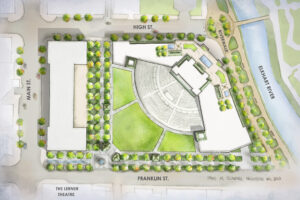 The Amp Group is led by Lori Harris, president, and Rex Martin. Martin is the fifth generation CEO of NIBCO, a world renowned plumbing parts manufacturer.
The Amp Group is led by Lori Harris, president, and Rex Martin. Martin is the fifth generation CEO of NIBCO, a world renowned plumbing parts manufacturer.
“Rex is spearheading this as a legacy piece, a gift to the community,” Brown noted. “Lori is making sure we do it right. Right now, we even have a swimming pool on the roof for artists.”
Elkhart Mayor Rod Roberson is 100 percent on board, “our biggest cheerleader,” said Brown, which Frank confirmed.
Funding is primarily private donations. More than half of the project cost has been raised, Brown added.
Elkhart proper is 50,000 people. But the amphitheater, like The Lerner, will draw from all of Michiana. “We have two million people in a 60-mile radius,” Frank said. “The Lerner consistently pulls its patron base from Indiana, Michigan, Illinois and Ohio.”
The artists love The Lerner and Elkhart already, Frank added. Over and over again, she has seen postings on social media of artists sitting under a tree in the current green space, writing music, or going into boutique shops and buying what they might wear on stage that night. Besides Main Street, the city’s riverwalk is an attractive downtown feature.
“We’re full steam ahead,” Frank said. “It’s going to be transformative for this region.”
Do you want to receive a Front Row News weekly digest?
Categories
- Allied (856)
- Architecture (147)
- Arenas (744)
- Career (890)
- Convention Centers (889)
- Education (608)
- Events (1,528)
- Food & Beverage (193)
- Foundation (113)
- Guest Experience (1,482)
- Industry News (2,253)
- Leadership (1,872)
- Marketing (150)
- Membership (1,985)
- Music (212)
- Performing Arts Centers (453)
- Professional Development (398)
- Research (127)
- Safety & Security (425)
- Sports (763)
- Stadiums (607)
- Student (159)
- Technology (515)
- Ticketing (92)
- Touring (82)
- Trends (357)
- Uncategorized (771)
- Universities (216)
- Video (25)
- Young Professional (198)
Twitter Feed
- Twitter feed loading
Recent Posts
- GEODIS Park Selects Allied Universal As Its Preferred Event Services Provider
- Venuworks Appoints Marc Solis as Executive Director of the Fresno Convention and Entertainment Center
- Los Angeles Convention Center Diverts 8,000 Pounds of Wood Waste to Local Foundation Supporting Fire Victims
- Fort Worth Unveils Plans for Phase 2 of Convention Center Transformation
- San Diego Convention Center CEO Announces Retirement After a Decade of Leadership
Categories
- Allied
- Architecture
- Arenas
- Career
- Convention Centers
- Education
- Events
- Food & Beverage
- Foundation
- Guest Experience
- Industry News
- Leadership
- Marketing
- Membership
- Music
- Performing Arts Centers
- Professional Development
- Research
- Safety & Security
- Sports
- Stadiums
- Student
- Technology
- Ticketing
- Touring
- Trends
- Uncategorized
- Universities
- Video
- Young Professional
Archives
- February 2026
- January 2026
- December 2025
- November 2025
- October 2025
- September 2025
- August 2025
- July 2025
- June 2025
- May 2025
- April 2025
- March 2025
- February 2025
- January 2025
- December 2024
- November 2024
- October 2024
- September 2024
- August 2024
- July 2024
- June 2024
- May 2024
- April 2024
- March 2024
- February 2024
- January 2024
- December 2023
- November 2023
- October 2023
- September 2023
- August 2023
- July 2023
- June 2023
- May 2023
- April 2023
- March 2023
- February 2023
- January 2023
- December 2022
- November 2022
- October 2022
- September 2022
- August 2022
- July 2022
- June 2022
- May 2022
- April 2022
- March 2022
- February 2022
- January 2022
- December 2021
- November 2021
- October 2021
- September 2021
- August 2021
- July 2021
- June 2021
- May 2021
- April 2021
- March 2021
- February 2021
- January 2021
- December 2020
- November 2020
- October 2020
- September 2020
- August 2020
- July 2020
- June 2020
- May 2020
- April 2020
- March 2020
- February 2020
- January 2020
- December 2019
- November 2019
- October 2019
- September 2019
- August 2019
- July 2019
- June 2019
- May 2019
- April 2019
- March 2019
- February 2019
- January 2019
- December 2018
- November 2018
- October 2018
- September 2018
- August 2018
- July 2018
- June 2018
- May 2018
- April 2018
- March 2018
- February 2018
- January 2018
- December 2017
- November 2017
- October 2017
- September 2017
- August 2017
- July 2017
- June 2017
- May 2017
- April 2017
- March 2017
- February 2017
- January 2017
- December 2016
- November 2016
- October 2016
- September 2016
- August 2016
- July 2016
- June 2016
- May 2016
- April 2016
- March 2016
- February 2016
- January 2016
- December 2015
- November 2015
- October 2015
- September 2015
- August 2015
- July 2015
- June 2015
- May 2015
- April 2015
- March 2015
- February 2015
- January 2015
- December 2014
- November 2014
- October 2014
- September 2014
- August 2014
- July 2014
- June 2014
- May 2014
- April 2014
- March 2014
- February 2014
- January 2014
- December 2013
- November 2013
- October 2013
- September 2013
- August 2013
- July 2013
- June 2013
- May 2013
- April 2013
- March 2013
- February 2013
- January 2013
- May 2012
- March 2012
- December 2011
- November 2011
- October 2011
Recent Comments
- Frank Bradshaw, Ph.D., CVE on John Meyer, CVE, a Tireless Advocate of Certification for Venue Professionals, Has Died
- Neil Sulkes on Hilary Hartung, Friend to Many in Venue Marketing, Has Left Us
- Jason Parker, CVE on The Devastation of Hurricane Helene and How We Can Support One Another
- Larry Perkins on Touhey Testifies Against Speculative Ticketing Before Congressional Subcommittee
- Peter Secord on Major Players for Planned Elkhart Amphitheater Were in the Mix at VenueConnect
